
New anti-cancer drugs put cancers to sleep—permanently
Table of Contents

In a world first, Melbourne scientists have discovered a new type of anti-cancer drug that can put cancer cells into a permanent sleep, without the harmful side-effects caused by conventional cancer therapies. Published today in the journal Nature, the research reveals the first class of anti-cancer drugs that work by putting the cancer cell to sleep – arresting tumour growth and spread without damaging the cells’ DNA. The new class of drugs could provide an exciting alternative for people with cancer, and has already shown great promise in halting cancer progression in models of blood and liver cancers, as well as in delaying cancer relapse.
Research led by Associate Professor Tim Thomas and Associate Professor Anne Voss from the Walter and Eliza Hall Institute, Professor Jonathan Baell from the Monash Institute of Pharmaceutical Sciences and Dr. Brendon Monahan from Cancers Therapeutics CRC investigated whether inhibiting KAT6A and KAT6B could be a new approach to treating cancer. Associate Professor Thomas said the new class of drugs was the first to target KAT6A and KAT6B proteins. Both are known to play an important role in driving cancer.
KAT6A sits at number 12 on the list of genes most commonly amplified in cancers. The compounds had already shown great promise in preclinical testing, he said. The research efforts were almost a decade in the making, requiring strong collaboration between experts in cancer research, medicinal chemistry and drug discovery.
Source: medicalxpress.com


